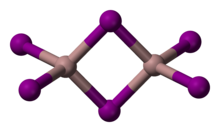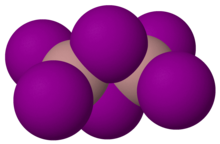Gallium(III) iodide
Appearance
(Redirected from GaI3)

| |

| |
| Names | |
|---|---|
| Other names
gallium triiodide
| |
| Identifiers | |
3D model (JSmol)
|
|
| ChemSpider | |
| ECHA InfoCard | 100.033.269 |
| EC Number |
|
PubChem CID
|
|
CompTox Dashboard (EPA)
|
|
| |
| |
| Properties | |
| GaI3 | |
| Molar mass | 450.436 g/mol |
| Appearance | light yellow powder |
| Density | 4.5 g/cm3[1] |
| Melting point | 212 °C (414 °F; 485 K)[1] |
| Boiling point | 340 °C (644 °F; 613 K)[1] |
| decomposes | |
| −149.0·10−6 cm3/mol | |
| Thermochemistry[2] | |
Heat capacity (C)
|
100 J/(mol·K) |
Std molar
entropy (S⦵298) |
205.0 J/(mol·K) |
Std enthalpy of
formation (ΔfH⦵298) |
−238.9 kJ/mol |
| Hazards | |
| GHS labelling: | |
  
| |
| Danger | |
| H314, H317, H334, H335, H361 | |
| P280, P305+P351+P338, P310 | |
| NFPA 704 (fire diamond) | |
Except where otherwise noted, data are given for materials in their standard state (at 25 °C [77 °F], 100 kPa).
| |
Gallium(III) iodide is the inorganic compound with the formula GaI3. A yellow hygroscopic solid, it is the most common iodide of gallium.[3] In the chemical vapor transport method of growing crystals of gallium arsenide uses iodine as the transport agent. In the solid state, it exists as the dimer Ga2I6.[4] When vaporized, its forms GaI3 molecules of D3h symmetry where the Ga–I distance is 2.458 Angstroms.[5]
Gallium triiodide can be reduced with gallium metal to give a green-colored gallium(I) iodide. The nature of this species is unclear, but it is useful for the preparation of gallium(I) and gallium(II) compounds.[6][7]
See also
[edit]References
[edit]- ^ a b c Haynes, p. 4.63
- ^ Haynes, p. 5.20
- ^ Donges, E. (1963). "Gallium(III) Iodide". In Brauer, G. (ed.). Handbook of Preparative Inorganic Chemistry, 2nd Ed. Vol. 1. NY, NY: Academic Press. p. 846.
- ^ Brünig, C.; Locmelis, S.; Milke, E.; Binnewies, M. (2006). "Chemischer Transport fester Lösungen. 27. Mischphasenbildung und chemischer Transport im System Zn Se/Ga As". Zeitschrift für Anorganische und Allgemeine Chemie. 632 (6): 1067–1072. doi:10.1002/zaac.200600008.
- ^ Haynes, p. 9.23
- ^ Baker, Robert J.; Jones, Cameron (2005). ""GaI": A versatile reagent for the synthetic chemist". Dalton Trans (8): 1341–1348. doi:10.1039/b501310k. hdl:2262/69572. PMID 15824768.
- ^ Green, Shaun P.; Jones, Cameron; Stasch, Andreas; Rose, Richard P. (2007). "'GaI': A new reagent for chemo- and diastereoselective C–C bond forming reactions". New J. Chem. 31: 127–134. doi:10.1039/b613669a.
Cited sources
[edit]- Haynes, William M., ed. (2016). CRC Handbook of Chemistry and Physics (97th ed.). CRC Press. ISBN 9781498754293.

